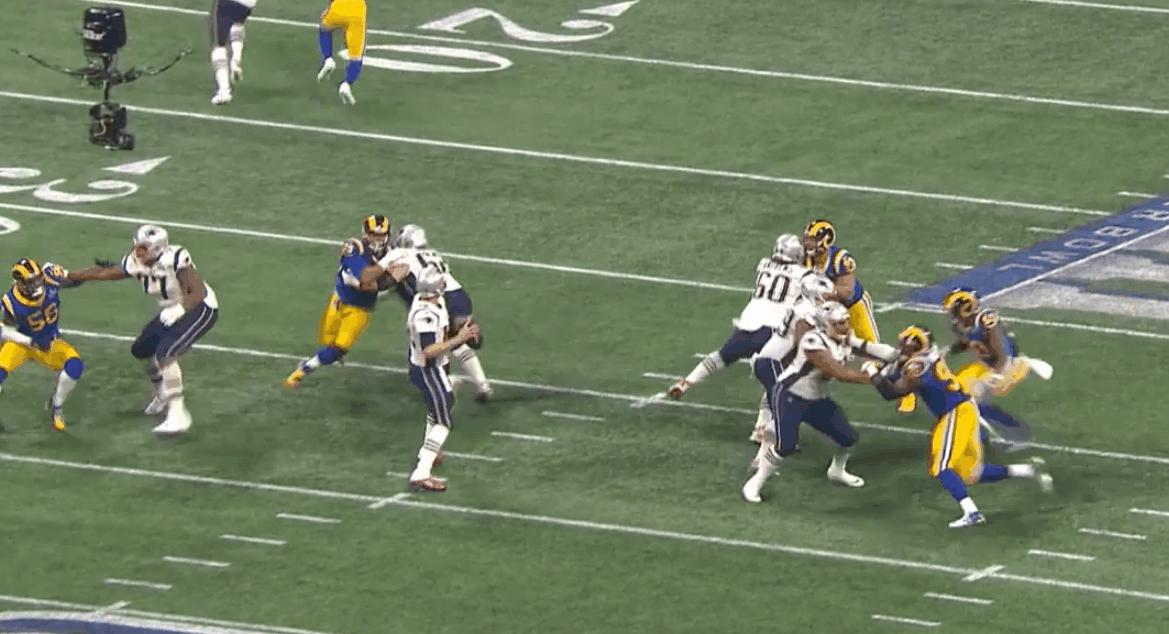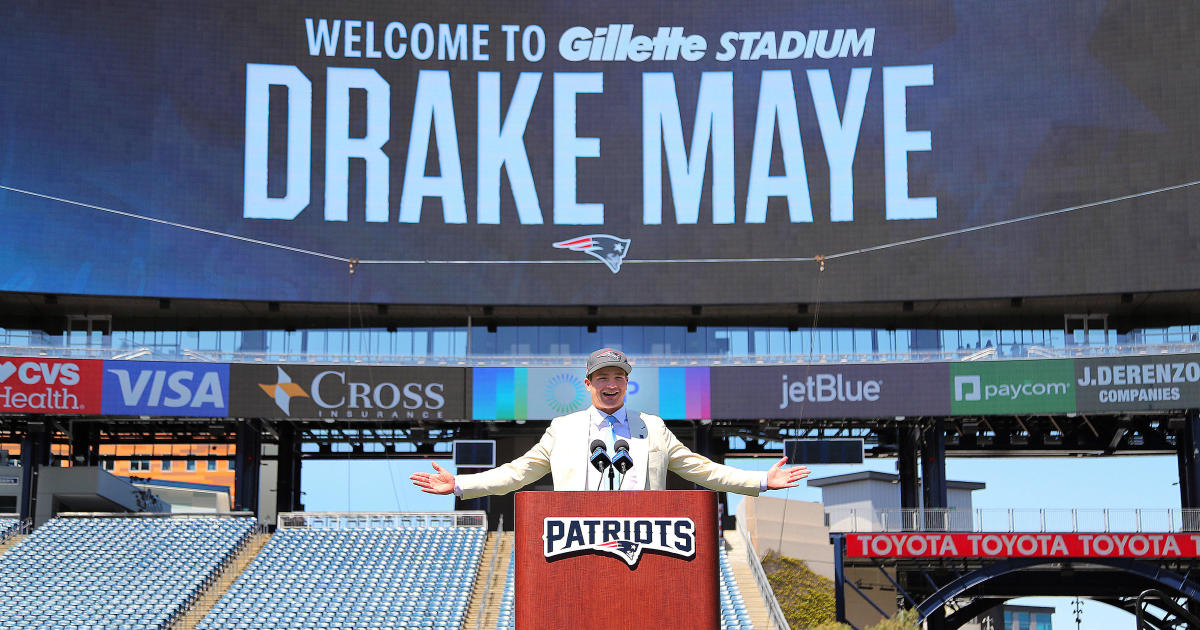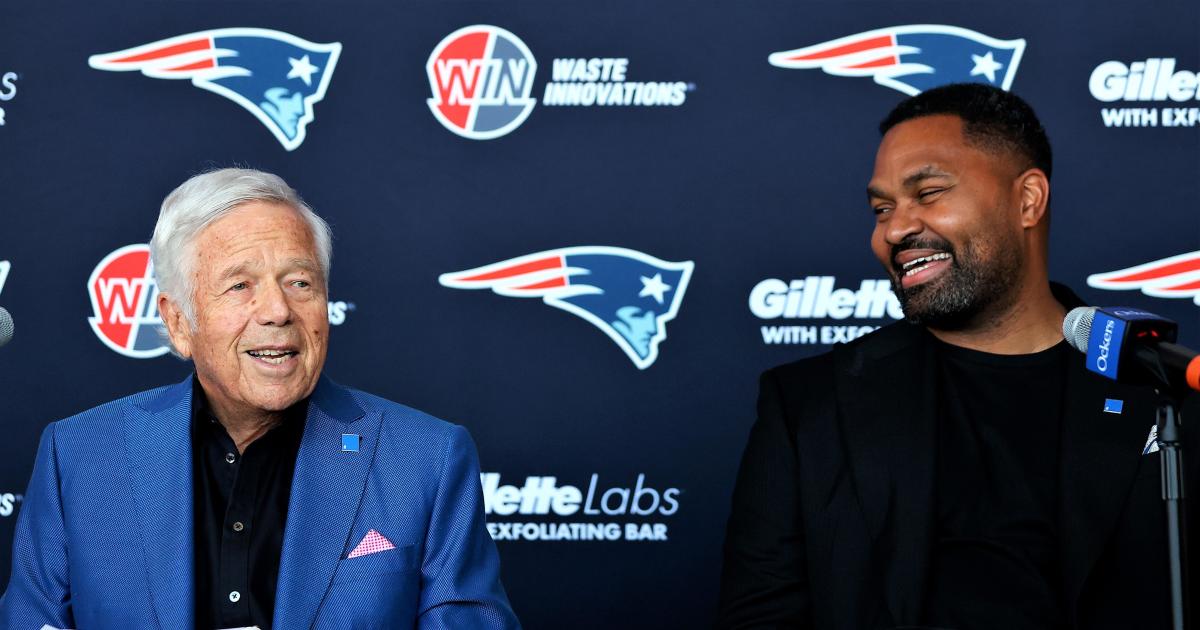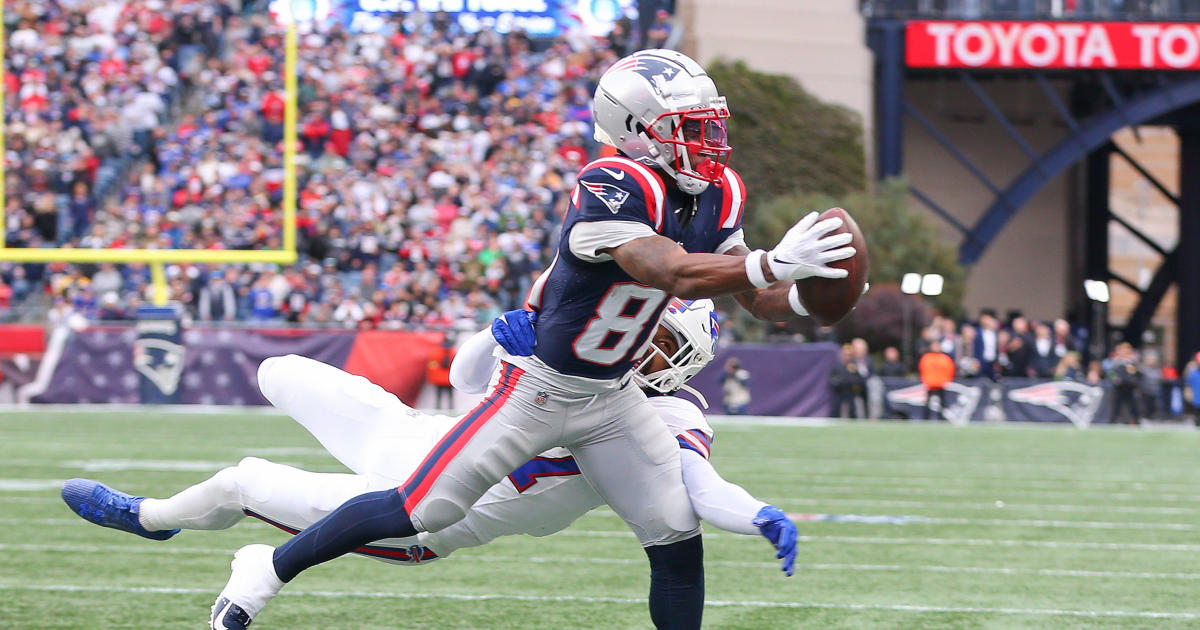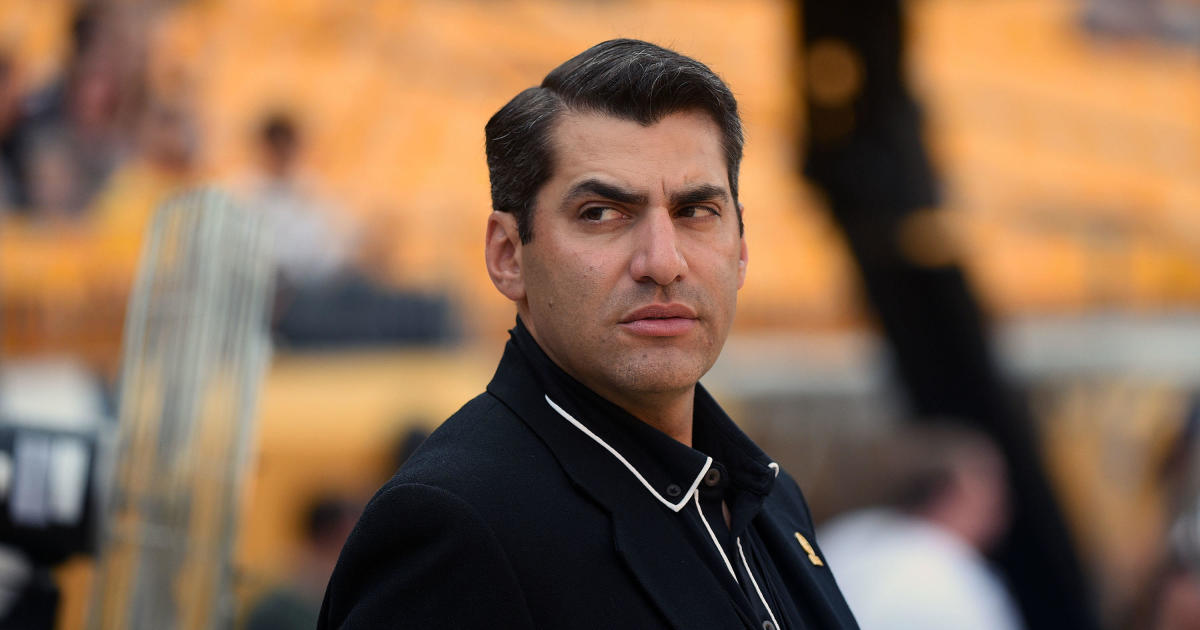The anatomy of how the Patriots got here
BOSTON -- At 1-4, there is no hiding anymore for the New England Patriots. The rest of the country and the football world at large know what those of us in New England have known for several years running.
The Patriots are not very good.
This year, in fact, they're quite bad. While losses to the Eagles and Dolphins weren't altogether discouraging, and while even an ugly loss in Dallas to a good Cowboys team could have been chalked up as one terrible day, Sunday's outright whooping at the hands of the mediocre New Orleans Saints in Foxboro drove home the point that this year, the Patriots are bottoming out.
To some, this is a shocking development. To others, it's been evident that things have been building to this for years.
No matter where anyone might come from on that spectrum, they're all ending up at the same point in recognizing that the present-day reality for the New England Patriots is grim. It's worth exploring, then, how exactly the Patriots got there.
Let's try.
No Plans To Replace Two GOATs
When Bill Belichick decided that he didn't want to put his eggs into the basket of a 43-year-old quarterback, it was not a horrible decision in and of itself. No quarterback in the history of the sport had ever played successfully through his 40s, and Belichick didn't believe Tom Brady would be the one to blaze a new trail.
Belichick was wrong about that. Extremely wrong. Brady won 32 more regular-season games, won five more playoff games, won another Super Bowl, threw 108 more touchdowns and amassed nearly 15,000 more passing yards after leaving New England, posting a 98.1 passer rating from ages 43-45 and finishing second in MVP voting one year.
Yet Belichick could have survived the misfire if he had a plan -- any plan -- for the most important job in sports. But he didn't.
As you'll recall, in the spring of 2020, the Patriots were very high on Jarrett Stidham. So high, in fact, that after spring practices ... they went out and got whichever free-agent quarterback was still available for short money. That player was Cam Newton, who was on his last legs, and the Patriots as we knew them were officially no more.
(Belichick also might have preferred swapping Brady for Jimmy Garoppolo years earlier, though we've never gotten concrete information on that one, necessarily.)
Yet having no plan whatsoever to replace the greatest quarterback of all time was not the lone case of Belichick having no plan to replace a GOAT. You also may recall that Belichick tried to trade Rob Gronkowski to Detroit prior to the 2018 season. Gronkowski threatened retirement, killing the deal. And though Belichick clearly didn't want Gronkowski on the team anymore, it certainly worked out for him that the tight end stuck around. The winning touchdown in the Super Bowl that year was set up by this play:
Gronkowski wasn't supposed to be on the Patriots that year, yet he ended up catching 12 passes for 166 yards in the AFC Championship Game (a six-point win) and the Super Bowl (a 10-point win).
He did depart from the Patriots after that, temporarily retiring until he could later join up with Brady in Tampa Bay. And Belichick's plan to replace arguably the greatest tight end of all time involved ... coaxing a 39-year-old Ben Watson out of retirement, signing journeyman Matt LaCosse, and utilizing seventh-round draft pick Ryan Izzo for Brady's final season in New England.
That Watson-LaCosse-Izzo trio combined to catch 36 passes for 418 yards and two touchdowns all season long. Belichick drafted Devin Asiasi and Dalton Keen in the third round the following spring; they have combined for seven career receptions since getting selected three years ago. The position wasn't properly addressed until the 2021 offseason, when the team spent top dollar on Hunter Henry (a hit) and Jonnu Smith (a miss).
Going from Brady to Stidham and then Newton showed poor planning at the most important position on the field, despite having years to plan for the end of the quarterback's run in New England. Going from Gronkowski to Watson-Izzo-LaCosse showed, at the very least, a lack of value on the work that Gronkowski did at tight end. Or it showed an improper evaluation of the importance of the tight end position.
Either way, the Patriots lost two GOATs and had no plans in place to try to make up for those massive losses. That lack of planning accounts for the beginning of this era of Patriots football, during which the team has gone 26-29.
Poor Management Of Offensive Roster
After losing Gronkowski to retirement a year after losing Danny Amendola and Dion Lewis to free agency, Brady was understandably displeased with the offensive firepower around him in 2019. Belichick tried to remedy this situation, spending a lot of money and draft capital to add the following receivers:
- N'Keal Harry
- Antonio Brown
- Mohamed Sanu
The Patriots selected Harry in the draft before Deebo Samuel, A.J. Brown, Terry McLaurin, Diontae Johnson and D.K. Metcalf. He never clicked in Foxboro, he has caught 19 passes since 2021 and is, unequivocally, a first-round bust.
The Patriots gave $10 million guaranteed to Brown, who had very clearly become the least reliable player in the NFL. The union lasted one game, and Brown's contract lingered through 2020, when he accounted for $5.75 million of dead money against the cap.
And Sanu was the lesser receiver moved before the trade deadline, with Emmanuel Sanders catching 36 passes for 502 yards and three touchdowns after being dealt to San Francisco for a third-round pick and a fourth-round pick. Sanu caught 26 passes for 207 yards and one touchdown while battling injury during his time with the Patriots, who gave up a second-round pick to get him. He just never looked like the receiver he had been prior to turning 30, which also might have been tied to the knee injury he suffered while returning punts for New England. (He came to New England having fielded exactly one punt in his career before being handed that job.)
Since then, the lack of impact pass-catchers has been a staple of Patriots offenses. Damiere Byrd was the "big" acquisition for 2020, Nelson Agholor and Jonnu Smith were whiffs in 2021 (Hunter Henry and Kendrick Bourne were good finds in free agency, to be fair), and DeVante Parker (trade) and Tyquan Thornton (draft) in 2022 haven't panned out the way the team might have envisioned.
The major success story from that era was Jakobi Meyers, who made the team as an undrafted rookie the year Harry was taken in the first round. He blossomed into a reliable, hard-working, perfect Patriot at receiver, keeping alive the legacy set by the likes of Julian Edelman and Troy Brown before him. The Patriots let him walk in free agency, though, instead signing JuJu Smith-Schuster ... who has 14 catches for 86 yards in five games.
Instead of making a strong play for DeAndre Hopkins, the Patriots were content with their additions of Smith-Schuster, Mike Gesicki, and rookies Demario Douglas and Kayshon Boutte.
The team has, unsurprisingly, averaged fewer than 200 passing yards over the past four weeks.
That's not entirely due to the receivers, though, as the offensive line might be the worst unit that's ever been put together under Belichick's watch. Similar to the 2019 investments in Harry/Brown/Sanu, it's not as though no resources have been used to address the position. The resources just haven't been spent wisely.
Calvin Anderson and Riley Reiff were brought in for real money to compete at tackle; neither can do it. The spot is currently being manned by Vederian Lowe, who had 33 NFL snaps to his name prior to signing with the Patriots and who is struggling mightily to protect Mac Jones. Fourth-round picks were used on linemen -- Jake Andrews out of Troy, Sidy Sow out of Eastern Michigan, and Atonio Mafi out of UCLA -- but none of those players are able to play at an NFL level right now. (Mafi has played the most and has a 32.9 PFF grade. Sow has a 28.8 grade.)
Though it was a smaller scale than Brady and Gronkowski, Belichick didn't fully strategize a plan for the end of Joe Thuney's Patriots career. The team placed the franchise tag on him in 2020, paying him an absurd $14.8 million salary to play left guard during a sub-.500 season. He left after 2020; Shaq Mason was traded away before he was due some real money a year later. Equally absurd was the team spending a first-round pick on Cole Strange, a guard out of Chattanooga. Strange likely would have been available later in the draft, and even if he hadn't been, a player of similar caliber surely could have been found via free agency or the draft.
Coaching along the line has been an issue -- and we'll cover that shortly -- but personnel has been a problem, too. Combined with the inability to build a potent receiving corps as well as the jettisoning of a player who did everything right, it's no surprise that the offense as currently constructed lacks a clear identity and direction.
The current quarterback may or may not be good enough to be a top player in the league at his position, but it's far from the only problem inhibiting the offense. And the fact that the Patriots have a quarterback on a cheap rookie deal but aren't spending big on playmakers is largely at the root of all of it.
Losses Of Decades Of Coaching/Personnel Experience
Dante Scarnecchia spent 34 years working for the New England Patriots, working his final 19 years as the team's offensive line coach. He's widely regarded as one of the best offensive line coach in the game's history, and the Patriots rarely if ever had major concerns on the offensive line during his tenure. When the team did have issues, Scarnecchia could often fix them -- both in-game and between games.
Since he retired after the 2019 campaign, the Patriots went with co-coaches in 2020 (Carmen Bricillo and Cole Popovich), before partying ways with Popovich before the 2021 season. Bricillo left for the Raiders after 2021, and Matt Patricia -- who had just one season as an assistant O-line coach way back in 2005 on his resume -- took the job in 2022. This year, it's Adrian Klemm filling the role.
It's been a revolving door at offensive line coach. There's no consistency, and there's no real program anymore.
Josh McDaniels and Ivan Fears left after 2021, carrying 43 years of Patriots coaching experience with them. Ernie Adams, who had been Belichick's right-hand man since high school, had left the year before.
The front office also lost Nick Caserio (20 seasons with Patriots) after 2020, Monti Ossenfort (14 years with Patriots) after 2019, and Dave Ziegler (nine years with Patriots) after 2021.
There's been a lot of institutional knowledge heading out the door over the past four years. And the replacements understandably can't recreate the fabric of what made the Patriots the Patriots for so long.
"I Want To Coach Guys I Like"
As the story goes, Bill Belichick spoke to Urban Meyer in the spring of 2017 after seemingly having a bit of an epiphany. Speaking to a crowd at a coaching clinic, Meyer shared a tidbit he had been told by Belichick.
"I started asking him about it and he made this point to me and I shared this with our team," Meyer shared. "[Belichick] said, 'At this point in my career, I want to coach guys I like. I want to coach guys I want to be around and that's it and 'I'm not going to coach anybody else.'"
Now, that is a secondhand story told by Urban Meyer, so the details could be slightly off. But it doesn't seem like they are. It seems like a message Meyer committed to memory rather quickly.
And if that is indeed Belichick's mode of thinking late in his coaching career, it's clearly not a successful approach.
They did make the Super Bowl that following season, but lost. (Perhaps Malcolm Butler became somebody Belichick did not want to coach once January turned to February in 2018.) They won the Super Bowl the next year, but again, that was only after Belichick tried to unceremoniously remove Gronkowski from the roster.
Along the way, the razoring away of Brady's trusted targets -- Gronkowski, Amendola, Lewis, Chris Hogan -- continued, eventually leading to the removal of Brady himself. Messages -- some cryptic, others more direct -- from players who left detailed how unpleasant it became for those players to be working for Belichick at the end.
The desire to coach players he likes seemingly transferred to the building of his staff, too. What else could explain the decision to employ Patricia as an offensive coordinator? The fact that he came at almost zero cost to the Patriots might have made it an easier sell to ownership that it was worth a shot for Belichick to have his trusted confidante fill a role he was simply not suited to fill. Bringing back a loyalist like Joe Judge -- who also came at almost no cost to the Patriots -- would be in line with that thinking, too.
If Belichick got tired of coaching players he didn't like, he seemingly didn't let Super Bowl rings stop him from saying farewell to anyone who didn't fit the bill. For a coach who always projects a philosophy of doing what's best for the team, this thought process seems antithetical to that effort.
The Here And Now
All of that set up the years of mediocrity that we've witnessed since 2020 -- but really 2018, if you want to look exclusively at the offensive personnel. But it doesn't explain what changed this year.
Most simply, the Patriots took their 26th-ranked offense and ran it back ... but without their best and most reliable receiver. The replacement of Matt Patricia with Bill O'Brien was supposed to be more than enough to cover that loss. Logically speaking, that should be true, given how inexperienced and unimpressive Patricia was in that role.
But O'Brien, quite simply, has underwhelmed. On a team with receivers who cannot routinely get open against man coverage, the scheme is not creating opportunities in the passing game. There's blame to be spread around with the abject disaster at offensive line, no doubt, but O'Brien is not tapping into his wealth of coaching experience to work around it. Whether it's Klemm, O'Brien, or both, the offensive line collectively has no idea what it's doing on a play-to-play basis. The end result is a backfield full of quarterbacks and running backs who simply look terrible.
The defense was good, but not good enough to withstand losing its two best players in Christian Gonzalez and Matthew Judon. And the special teams, which has been degrading for years, remains a mistake-riddled area for a Patriots team that can currently hang its hat on absolutely nothing.
Once known for having his eye on every single detail of the football operation, Belichick no longer has that claim. That might have always been the case, but he no longer has trusted and experienced generals like McDaniels, Scarnecchia, Adams and Fears to help fill in the cracks when needed. Personnel-wise, Matt Groh simply cannot have the same rapport with Belichick that Caserio did. The pushback in the front office is likely not as forceful and assured as it used to be.
The end result of all of that is ... this. And it's bad enough to feel like we've officially hit the end of this historic run of professional football in New England.
